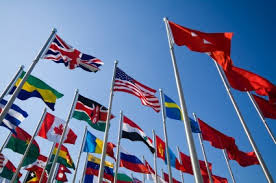
At the onset of the second millennium, the
position of the Nigerian Jurisprudence pertaining to the hierarchy of
international treaties vis-avis domestic laws was that the former had no
superiority over the latter. Additionally, pursuant to section 12 (1) of the
1979 constitution in pari materia with Section 12(1) of the
1999 Constitution as amended, international treaties or conventions can only
assume the force of law in Nigeria following ratification by the National
Assembly. Section 12(1) of the Constitution provides as follows:
position of the Nigerian Jurisprudence pertaining to the hierarchy of
international treaties vis-avis domestic laws was that the former had no
superiority over the latter. Additionally, pursuant to section 12 (1) of the
1979 constitution in pari materia with Section 12(1) of the
1999 Constitution as amended, international treaties or conventions can only
assume the force of law in Nigeria following ratification by the National
Assembly. Section 12(1) of the Constitution provides as follows:
“No treaty between the Federation and any
other country shall have the force of law except to the extent to which any
such treaty has been enacted into law by the National Assembly.”
other country shall have the force of law except to the extent to which any
such treaty has been enacted into law by the National Assembly.”
Furthermore, the Supreme Court in the case
of Abacha v Fawehinmi (2000) 6NWLR (Pt.660) 228 held
that an international treaty has no such force of law as to make its provisions
justiciable in our courts before its enactment into law by the National
Assembly. In the case under reference, the Apex Court examined the application
of the African Charter to the domestic enforcement of fundamental human rights
and concluded that the African Charter had the force of law in Nigeria having
been domesticated into our municipal law by the African Charter on Human and
Peoples’ Rights (Ratification and Enforcement) Act Cap. 10 Laws of the
Federation of Nigeria 1990. The Court further held that treaties which have
been incorporated into the body of the municipal laws such as the African
Charter ranks at par with the municipal laws.
of Abacha v Fawehinmi (2000) 6NWLR (Pt.660) 228 held
that an international treaty has no such force of law as to make its provisions
justiciable in our courts before its enactment into law by the National
Assembly. In the case under reference, the Apex Court examined the application
of the African Charter to the domestic enforcement of fundamental human rights
and concluded that the African Charter had the force of law in Nigeria having
been domesticated into our municipal law by the African Charter on Human and
Peoples’ Rights (Ratification and Enforcement) Act Cap. 10 Laws of the
Federation of Nigeria 1990. The Court further held that treaties which have
been incorporated into the body of the municipal laws such as the African
Charter ranks at par with the municipal laws.
Recently however, a different dimension
appears to have been introduced into this laid down principle in the case of JFS
Investment Limited V Brawal Line Limited & 2 Ors (2010) 18
NWLR [Pt.1225] 495, thus creating a dichotomy in its application to pre 1960
treaties and post 1979 treaties as between Nigeria and the international
community. A relevant example of a pre-1960 treaty is the Hague Rules 1924. The
Hague Rules 1924, codified in the Carriage of Goods by Sea Act Cap C2 Laws of
the Federation 2004 (COGSA), was an existing law in Nigeria at the time the
1979 Constitution came into force. Given that laws generally do not have
retroactive powers, the Supreme Court held that Section 12 of the 1979
constitution cannot affect the applicability of the Hague Rules 1924 in
Nigeria.
appears to have been introduced into this laid down principle in the case of JFS
Investment Limited V Brawal Line Limited & 2 Ors (2010) 18
NWLR [Pt.1225] 495, thus creating a dichotomy in its application to pre 1960
treaties and post 1979 treaties as between Nigeria and the international
community. A relevant example of a pre-1960 treaty is the Hague Rules 1924. The
Hague Rules 1924, codified in the Carriage of Goods by Sea Act Cap C2 Laws of
the Federation 2004 (COGSA), was an existing law in Nigeria at the time the
1979 Constitution came into force. Given that laws generally do not have
retroactive powers, the Supreme Court held that Section 12 of the 1979
constitution cannot affect the applicability of the Hague Rules 1924 in
Nigeria.
The reason for this exception is that by
October 1960 at the Nigerian Independence, the Government of the Federation
assumed all obligations and responsibilities of the colonial regime of the
government which arose from valid international instruments such as the Hague
Rules 1924. Nigeria became a party through exchange of letters between Hague,
the United Kingdom and the Government of Nigeria on October 1, 1960. The Hague
Rules 1924 was extended to Nigeria as a legislation which formed part of our
laws before independence, and was received as our laws after independence. As
such, the Supreme Court held that it does not require any further ratification
as stipulated in Section 12 of the 1979 Constitution before it can be applicable.
October 1960 at the Nigerian Independence, the Government of the Federation
assumed all obligations and responsibilities of the colonial regime of the
government which arose from valid international instruments such as the Hague
Rules 1924. Nigeria became a party through exchange of letters between Hague,
the United Kingdom and the Government of Nigeria on October 1, 1960. The Hague
Rules 1924 was extended to Nigeria as a legislation which formed part of our
laws before independence, and was received as our laws after independence. As
such, the Supreme Court held that it does not require any further ratification
as stipulated in Section 12 of the 1979 Constitution before it can be applicable.
The Supreme Court further held that the
Hague Rules 1924 must be deemed to be an Act of the National Assembly having
assumed the force of law in Nigeria and that the principle in the case of Abacha
v Fawehinmi is only applicable to post 1979 treaties and not
pre-1960 treaties. Finally, the Apex Court per Adekeye JSC at page 436, held as
follows:
Hague Rules 1924 must be deemed to be an Act of the National Assembly having
assumed the force of law in Nigeria and that the principle in the case of Abacha
v Fawehinmi is only applicable to post 1979 treaties and not
pre-1960 treaties. Finally, the Apex Court per Adekeye JSC at page 436, held as
follows:
“The Hague Rules is autonomous and above
domestic legislation of the subscribing countries and the provisions cannot be
suspended or interrupted even by the agreement of the parties”. [Emphasis
Added].
domestic legislation of the subscribing countries and the provisions cannot be
suspended or interrupted even by the agreement of the parties”. [Emphasis
Added].
From the foregoing, it would appear that
the Hague Rules have been elevated to a position superior to other domestic
legislations including the Constitution. However, we cannot seem to reconcile
this position with Section 1(1) of the Constitution which provides as
follows:
the Hague Rules have been elevated to a position superior to other domestic
legislations including the Constitution. However, we cannot seem to reconcile
this position with Section 1(1) of the Constitution which provides as
follows:
“1 (1) This Constitution is supreme and its
provisions shall have binding force on all authorities and persons throughout
the Federal Republic of Nigeria.
provisions shall have binding force on all authorities and persons throughout
the Federal Republic of Nigeria.
It is our considered opinion that the
Supreme Court ought to have held that the autonomy of the Hague Rules and their
superiority to domestic legislations subsisted up until the enactment of the
1979 constitution. Thereafter, it became subsumed under the hierarchical
structure of statutes in Nigeria with the Constitution at the topmost echelon
as established in the case of Labiyi v. Anretiola (1992)
NWLR (Pt. 258) 139; (1992) LPELR-1730(SC). We hope the Supreme Court will have
the opportunity to again revisit this issue in the nearest future to give
effect to the provisions of Section 1 of the Constitution.
Supreme Court ought to have held that the autonomy of the Hague Rules and their
superiority to domestic legislations subsisted up until the enactment of the
1979 constitution. Thereafter, it became subsumed under the hierarchical
structure of statutes in Nigeria with the Constitution at the topmost echelon
as established in the case of Labiyi v. Anretiola (1992)
NWLR (Pt. 258) 139; (1992) LPELR-1730(SC). We hope the Supreme Court will have
the opportunity to again revisit this issue in the nearest future to give
effect to the provisions of Section 1 of the Constitution.

Adebanke Ajayi is a Legal
Practitioner writing from Lagos.
This
post was first published here
post was first published here
Photo Credit – www.jux.law
